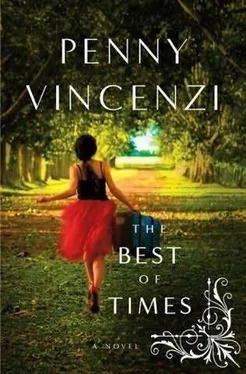Penny Vincenzi - The Best Of Times
Здесь есть возможность читать онлайн «Penny Vincenzi - The Best Of Times» весь текст электронной книги совершенно бесплатно (целиком полную версию без сокращений). В некоторых случаях можно слушать аудио, скачать через торрент в формате fb2 и присутствует краткое содержание. Жанр: Современная проза, на английском языке. Описание произведения, (предисловие) а так же отзывы посетителей доступны на портале библиотеки ЛибКат.
- Название:The Best Of Times
- Автор:
- Жанр:
- Год:неизвестен
- ISBN:нет данных
- Рейтинг книги:3 / 5. Голосов: 1
-
Избранное:Добавить в избранное
- Отзывы:
-
Ваша оценка:
- 60
- 1
- 2
- 3
- 4
- 5
The Best Of Times: краткое содержание, описание и аннотация
Предлагаем к чтению аннотацию, описание, краткое содержание или предисловие (зависит от того, что написал сам автор книги «The Best Of Times»). Если вы не нашли необходимую информацию о книге — напишите в комментариях, мы постараемся отыскать её.
The Best Of Times — читать онлайн бесплатно полную книгу (весь текст) целиком
Ниже представлен текст книги, разбитый по страницам. Система сохранения места последней прочитанной страницы, позволяет с удобством читать онлайн бесплатно книгу «The Best Of Times», без необходимости каждый раз заново искать на чём Вы остановились. Поставьте закладку, и сможете в любой момент перейти на страницу, на которой закончили чтение.
Интервал:
Закладка:
But when Daisy went to school, she began quite tentatively to work. She had a particular flair for colour, for using the unexpected, and she was beginning to earn a small reputation. But it all remained little more than a pleasingly rewarding hobby, very much what she did in her spare time: which was not actually in very large supply.
But that was how Jonathan liked it; and therefore she liked it too.
Spring that year had been especially lovely; it arrived early and stayed late, perfect green-and-gold days, so that as early as April, Laura was setting the outside table for lunch every Saturday and Sunday, and as May wore on, she and Jonathan would eat dinner outside as well, and watch the soft dusk settle over the garden, listening to the sounds of the river in the background, the hooting of tugs, the partying pleasure boats, the raw cries of the gulls.
“How lucky we are,” she said maybe a hundred times, smiling at Jonathan across the table, and he would raise his glass to her and reach for her hand and tell her he loved her.
But now it was midsummer and the rain had arrived: day after relentless day it fell from dark grey skies. Barbecues and summer parties were being cancelled, floaty summer dresses put away, the shops holding what they called end-of-season sales, and a stampede began for flights to Majorca and Ibiza for long weekends in the sun.
For the Gilliatts there was no such stampede; Laura was packing, as she did every year, for their annual pilgrimage to the lovely golden-stone farmhouse in the Dordogne, where the sun would shine down unstintingly on them, heating the water in the pool, ripening the grapes on the veranda vine, and warming the stones on the terrace so that the lizards might siesta in the afternoons along with their landlords.
“And thank goodness for it,” she said. “Poor Serena is so dreading the holidays, keeping the boys amused all those weeks, well, months really…”
Jonathan said just slightly shortly that he had thought the Edwardses were off to some ten-star hotel in Nice, not to mention the week they would spend with the Gilliatts on the way down; Laura said, well, that was true, but it still added up to just over three weeks, and that left six or even seven in London.
Jonathan said that most of his NHS patients would not regard that as too much of a hardship, given the three and a half weeks of luxury sunshine; he was less fond of Mark and Serena Edwards than Laura was. Mark was a public relations consultant for a big city firm, oversmooth and charming, but Serena was Laura’s best friend and, in Jonathan’s view, made Laura the repository of just too many confidences and secrets.
Jonathan was not able, of course, to spend nine weeks in the Dordogne; he took as much of his annual leave as he could and, for the rest of the time, flew out each Friday afternoon to Toulouse and back each Monday.
And so, as she read reports of what appeared to be almost continuous rain in England, and indeed listened to friends in England complaining about it and telling her how lucky she was not to be there, Laura savoured the long golden days even more than usual, and even more than usual counted her own multiple blessings.
Linda Di-Marcello was aware that she also was fairly fortunate, which meant that, given her line of work, she was doing very well indeed. Linda ran a theatrical agency, and as she often said, her role was a complex one. She was, in almost equal parts, nanny, therapist, and hustler; it was both exhausting and stressful, and she threatened repeatedly to give it up and do something quite different. “Something really undemanding, like brain surgery,” she would say with a smile. But she knew she never would; she loved it all too much.
The agency’s name was actually Di-Marcello and Carr; Francis Carr was her nonsleeping partner, as he put it, a gay banker who adored her, had faith in her, and had put up the money for the agency, in return for “absolutely no involvement and forty per cent of the profits.”
So far it had worked very well.
She was thirty-six, an acknowledged beauty, with dark red hair, dark brown eyes, and a deep, Marlene Dietrich-style voice, and she had been to drama school herself before deciding she really couldn’t hack the long, long slog into nonstardom and that she rather liked the idea of agenting. She had had the agency for five years; before that she had worked for several of the established organisations before setting out on her own. And she had proved to have a talent for it; she could look at an apparently plain, shy girl and see her shining on the screen; at a charmless, ungracious lout and know he could play Noel Coward.
She didn’t have many big stars on her books-yet. She had Thea Campbell, who had just won a BAFTA for her Jo in the new BBC version of Little Women , and Dougal Marriott, who had just been cast as the grown-up Billy in the sequel to Billy Elliot, and three or four more who were almost as successful, but she had a big battery of middle-rankers, mostly picked out by her from the drama schools, almost all of whom were carving out good careers for themselves. But her younger clients particularly found it hard to face reality; they were inevitably disappointed with the slow progress, and while most of them did part-time jobs in bars and restaurants or worked as runners for the TV companies, a handful were emotionally needy, impatient, and at worst disparaging of the work Linda could get them.
“You know,” she said irritably to Francis Carr, “I long to tell these kids that thousands and thousands of young people can do what they can do and do it superbly well; they need an awful lot of luck and star quality to stand out. And most of them don’t have those things. They’re an ungrateful bunch on the whole, you know; nothing’s ever good enough for them.”
Francis said that the same could be said of his clients, who never felt their money was invested quite well enough or that he gave any of them quite enough of his attention. “It’s human nature, Linda, fact of working life.”
“I suppose so. I’m obviously making a big fuss about nothing. And when somebody does take off and I know I’ve been a key part of that, it’s a great feeling.”
“Well, exactly. Has anyone taken off recently?”
“Not exactly. It’s all been a bit run-of-the-mill this summer. If you can call it summer indeed… Probably that’s what’s getting to me.”
“I don’t think so,” he said with a grin. “You’re always complaining about it.”
“Am I? God, how depressing for you. Sorry, Francis. I’ll try to be a bit more positive in future.”
Linda lived in a mansion apartment just off Baker Street: large and luxurious, expensively furnished-in a mix of antique and contemporary-and absolutely immaculate. Her office-a sleek, modern suite near Charlotte Street -was equally so. Linda was a perfectionist in every aspect of her life. She was, by any standards, a hugely successful woman. And yet she quite often felt she was actually a failure.
She was lonely, and however much she told herself that she was lucky, that she had a far better life now, happily single rather than unhappily married, she didn’t really believe it. No amount of looking at the rows of designer clothes she was able to buy, at her collections of art deco figures and lamps, at her growing gallery of modern paintings properly made up for it. She would have given all of it-well, most of it, anyway-not to be alone, not to be lonely.
She did have a social life-by most people’s standards a glamorous one. But it wasn’t quite the sort she wanted. Of course, Sex and the City had made singledom fashionable, which helped. Nobody had to sit at home staring at the cat anymore; you could lift the phone, call girlfriends or man friends, propose any kind of outing. You could do what you liked, when you liked it. During the week it was fine: she often worked late, and there were theatres and film screenings to go to; and she made sure her weekends were fully booked weeks or even months ahead. She did a lot of quick trips-flips, as she called them-to Paris, Milan, Rome, usually with one of her single girlfriends to visit galleries and shop; she was a Friend of Covent Garden, of Sadler’s Wells and the RSC. It would certainly take a fairly remarkable man to deliver so indulgent a lifestyle.
Читать дальшеИнтервал:
Закладка:
Похожие книги на «The Best Of Times»
Представляем Вашему вниманию похожие книги на «The Best Of Times» списком для выбора. Мы отобрали схожую по названию и смыслу литературу в надежде предоставить читателям больше вариантов отыскать новые, интересные, ещё непрочитанные произведения.
Обсуждение, отзывы о книге «The Best Of Times» и просто собственные мнения читателей. Оставьте ваши комментарии, напишите, что Вы думаете о произведении, его смысле или главных героях. Укажите что конкретно понравилось, а что нет, и почему Вы так считаете.












